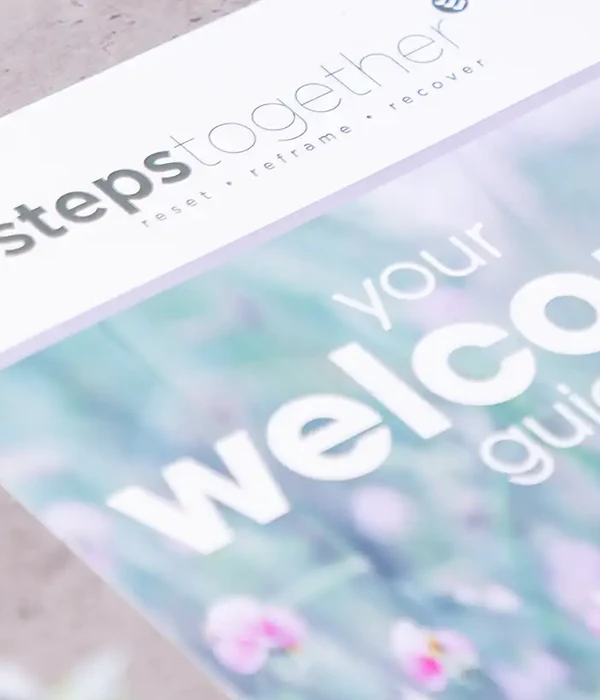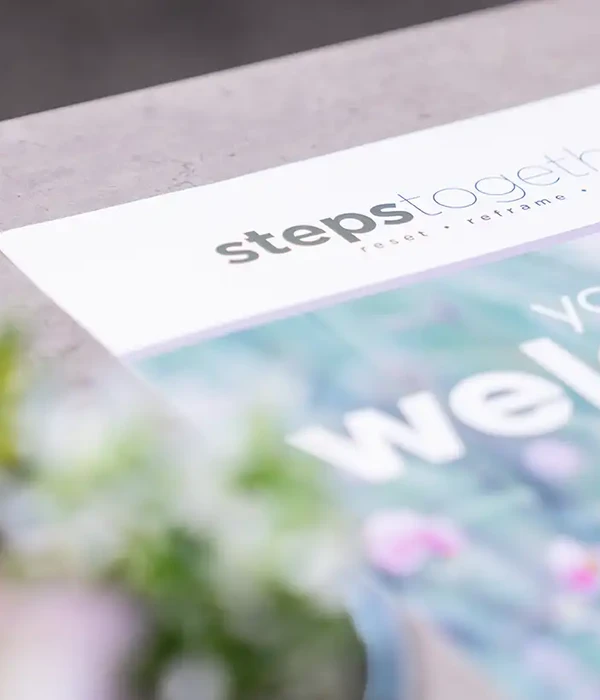MDMA Addiction Treatment
If you or someone you love is struggling with ecstasy (MDMA) addiction, support is within reach. Treatment for ecstasy misuse often includes medical detox, therapy, support groups, and structured rehabilitation programmes that help rebuild stability and well-being.
Taking the time to understand your treatment options is an important first step. Whether you are searching for information or ready to take action, knowing what to expect can make the process less overwhelming.

Take the First Step Towards Recovery
Steps Together offers personalised support and proven treatments, providing the care, guidance and encouragement you need to move forward with confidence and build a healthier future.

What Is MDMA and How Does It Cause Addiction?
MDMA is a synthetic drug that changes how your brain works, leading to both short-term effects and potential long-term harm. It is known for triggering feelings of pleasure, but it also carries risks of brain changes. While MDMA can cause addiction, it’s generally considered less addictive than substances like cocaine.
MDMA is most commonly called ‘ecstasy’ or ‘Molly.’ Alternative names like ‘E’ or ‘XTC’ may also be used. The drug is usually found as colourful tablets, capsules, or a white powder. People often take MDMA at parties, clubs, or music festivals. The street names can be misleading; ‘Molly’ is supposed to mean pure MDMA, but it can have other drugs mixed in.
MDMA’s Effects on the Brain
The use of MDMA can change the way your brain handles important chemicals called neurotransmitters. It mostly works on serotonin, which controls mood, and dopamine, which affects pleasure and motivation.
After you take MDMA, your brain releases large amounts of serotonin and dopamine. This causes effects like happiness and feeling close to others. However, these chemicals drop sharply later, leading to low mood, anxiety, and tiredness. Because it is a stimulant, the effects of ecstasy include increased energy.


Physical Effects of Molly
The use of ecstasy can cause a range of physical health effects. It increases body temperature, heart rate, and blood pressure, which can lead to dehydration or dangerous overheating. Using ecstasy may also cause muscle cramping, jaw clenching, nausea, and blurred vision.
In severe cases, using MDMA can cause liver, kidney, or heart failure. Repeated use may damage serotonin-producing neurons, which can affect mood regulation and sleep. MDMA also lowers inhibitions, increasing the chance of risky behaviours.
Ecstasy Addiction Treatment Options
MDMA addiction treatment focuses on safe withdrawal, therapy for underlying issues, and lasting support. Effective care gives you a higher chance of achieving recovery and avoiding relapse. Rehab treatment for ecstasy abuse can include:
Medical Assessment and Detoxification
When you seek treatment for MDMA addiction, a medical assessment is often the first step. This assessment checks your physical and mental health, sees if you use other substances, and helps plan the safest path for detox.
Detoxification helps your body remove MDMA while managing any withdrawal symptoms you might have. Medically supervised detox is safer than trying to quit alone. Staff will monitor your vital signs and watch for complications, such as anxiety, depression, insomnia, or paranoia.
Group Therapy and Support Systems
Group therapy gives you a safe setting to talk with others facing MDMA or other substance use problems. Support groups, such as Narcotics Anonymous, offer structured meetings where you can share experiences and listen to others’ stories of recovery.
Hearing how others handle challenges can increase your motivation. Group therapy can also help you feel less isolated and provide ongoing support after formal treatment ends. Many people continue with group meetings for accountability and encouragement.
Individual Therapy Approaches
Individual therapy addresses the reasons behind your MDMA use and helps change patterns that keep addiction going. Common approaches include cognitive behavioural therapy (CBT) and motivational interviewing. CBT enables you to identify triggers that lead to drug use and teaches you new ways to cope.
Therapists will work with you to set recovery goals and handle stress without turning to drugs. Therapy may explore mental health concerns linked with MDMA use, including anxiety or depression. You will get tools to challenge negative thinking and build healthier habits.
Inpatient and Outpatient Rehab
You may choose between an inpatient or an outpatient treatment programme based on your needs. Inpatient treatment means you stay at a treatment facility full-time for intensive care and support, which is helpful if you need a controlled environment for a severe addiction.
Outpatient rehab allows you to receive treatment for ecstasy addiction while living at home. You’ll visit the clinic several times a week for therapy and group sessions. Outpatient MDMA rehab is best if your use is moderate or you have work and family commitments.
Other drug addictions we treat at Steps Together

Mental Health Considerations
Mental health and substance use often affect each other. An MDMA addiction treatment programme often involves addressing both substance use and mental health, as MDMA can significantly impact mood, emotional regulation, and psychological wellbeing.
By focusing on both the physical and emotional aspects of addiction, treatment offers a stronger foundation for long-term healing. This helps you regain stability, resilience, and control over your life.
Dual Diagnosis and Mental Health Support
Many people struggling with addiction often struggle with mental health disorders such as depression, anxiety, or PTSD. This is called a dual diagnosis. A dual diagnosis means you need specialised care to manage both your addiction and your mental health symptoms at the same time.
An integrated treatment plan is essential. You may work with a psychiatrist, therapist, and addiction specialist so every aspect of your well-being is addressed. Medical teams also monitor for drug or medication interactions, which is especially important if you are taking antidepressants or anti-anxiety medication.

Recognising Signs and Symptoms of MDMA Addiction
MDMA, also known as ecstasy, changes the way your body and brain function. Common physical signs include dilated pupils, sweating, dehydration, and jaw clenching. Some people also experience nausea, lack of appetite, and blurred vision. When used in high amounts or for long periods, MDMA can raise body temperature, sometimes dangerously, a condition called hyperthermia, which can lead to organ failure.
Addiction to MDMA often changes how you act around friends, family, and at work or school. You may become secretive about your activities, start lying, or avoid people who question your behaviour. Skipping important events, neglecting responsibilities, or showing sudden drops in performance at work or school are also common.
Long-term ecstasy use can have serious impacts on your health and well-being. Over time, you may feel ongoing anxiety, depression, sleep issues, or memory loss. MDMA can damage serotonin cells in your brain, raising the risk of lasting neurotoxicity, which leads to deeper mood and memory problems and a reduced ability to feel pleasure naturally.
Continued MDMA Addiction Treatment
Recovery from MDMA addiction will require treating the whole person, not just the addiction. Treatment providers often promote relapse prevention by supporting your mental, emotional, and physical health. Ongoing support for ecstasy abuse and addiction may include:
Aftercare
Aftercare for MDMA addiction is a crucial part of staying sober. Once rehab treatment is completed, ongoing support helps individuals manage cravings, avoid triggers, and support a healthy, drug-free lifestyle.
Developing healthy routines, strengthening relationships, and continuing to address underlying emotional issues are key elements of effective aftercare. With continued support, long-term recovery from MDMA addiction is entirely possible.
Lifestyle Changes for Long-Term Recovery
Building long-term recovery from substance use disorder often means making major lifestyle changes. This can include developing a regular sleep routine, getting enough exercise, and building supportive social connections.
A daily structure, where you set small goals and stick to healthy habits, can prevent relapse. Stress management techniques such as journal writing, engaging in hobbies, or spending time in nature can help you cope with triggers and emotional ups and downs.
Ongoing Support
Staying mentally healthy after initial drug addiction treatment often involves ongoing support. This can include attending regular therapy sessions, participating in support groups, and keeping in touch with your healthcare team.
Treatment providers may recommend lifestyle changes such as regular exercise, balanced nutrition, and good sleep habits. Building a daily routine helps stabilise your mood and reduces anxiety.

Get Help for MDMA Use
If you’re struggling with ecstasy use, the most important thing to remember is that recovery is possible. At Steps Together, we offer professional MDMA addiction treatment tailored to your individual needs.
Our team is here to support you or your loved one through every stage of synthetic drug addiction recovery, from detox to aftercare. With the right help, you can break free from ecstasy use and regain control of your life.
Frequently Asked Questions
What are the most effective therapies for overcoming MDMA dependence?
The most effective therapies include cognitive behavioural therapy, group counselling, and individual talk therapy. Many treatment centres use structured plans that may include family support and relapse prevention. These therapies help you manage cravings, change harmful behaviours, and rebuild your life.
Can MDMA addiction be treated on an outpatient basis?
Yes, you can receive treatment for MDMA addiction through outpatient care if your dependency is not severe and your home environment is safe. Outpatient therapy allows you to attend sessions while living at home. Most services offer flexible schedules, so you can maintain work or studies throughout your treatment.
Are there any medications approved for the treatment of MDMA addiction?
Currently, there are no medications officially approved to treat MDMA addiction. Treatment mainly focuses on therapy, support groups, and creating a strong recovery network. In some cases, doctors may prescribe medicines to help with symptoms like anxiety or depression during your recovery process.
How long does treatment for MDMA addiction typically last?
Treatment usually lasts from a few weeks to several months, depending on your needs and progress. Some people benefit from outpatient programmes that may last 6 to 12 weeks, while residential rehab might continue for 28 days or more. Recovery is often an ongoing process that requires long-term effort and follow-up.
What are the potential risks of untreated MDMA dependency?
Untreated MDMA dependency can lead to psychological problems like depression, memory loss, and severe anxiety. It may also result in problems with sleep, relationships, and work. Long-term use increases your risk of mental health issues, risky behaviours, and negative health outcomes.
How does cognitive behavioural therapy help with MDMA addiction recovery?
Cognitive behavioural therapy helps you identify and change thoughts and actions linked to drug use. It gives you coping skills to handle cravings and avoid triggers that lead to relapse. Studies show that CBT can support recovery and improve your ability to stay drug-free.





